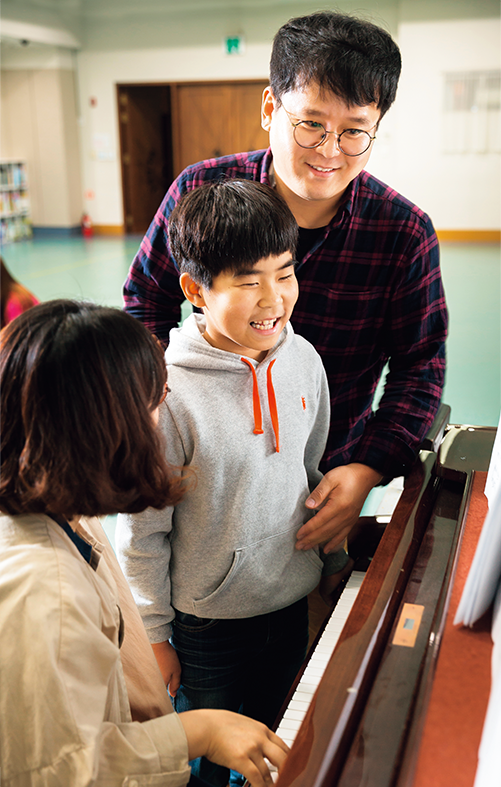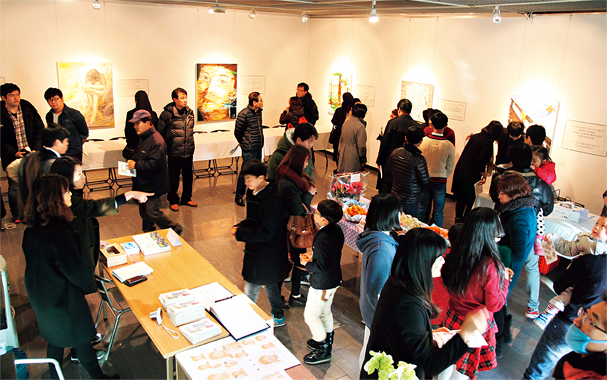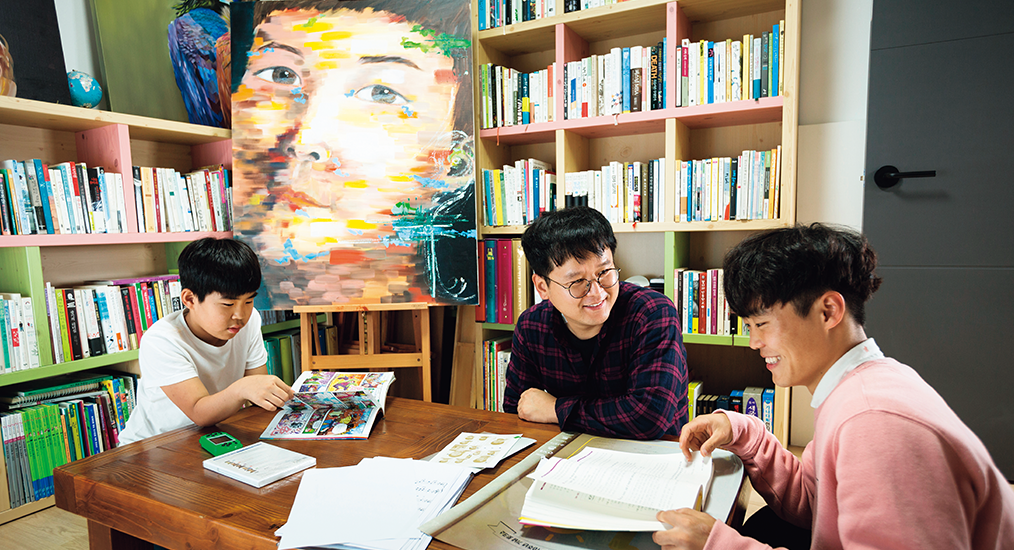“Gajok” (Family) is a group home that serves as alternative family for 10 teenage North Korean
defectors now living in Seoul without parents or any relatives to look after them. Kim Tae-hoon,
a 40-year-old unmarried man who heads the home, has been single–handedly raising an
unusual brood over the last 10 years. Neighbors call Kim “Bachelor Mom.”
The boys of Kim Tae-hoon’s Gajok, an alternative family for parentless
teen defectors from North Korea, enjoy a quiet weekend
evening of stories and books around the table in the living room of
their group home.
Kim Tae-hoon is very busy every morning, getting
up at 6 o’clock to prepare breakfast, wake up the
kids, feed them, and send them off to school.
After the hectic morning, he then cleans every corner of
the house and does the laundry to eliminate the “odor”
of the home’s 11 male occupants. This is his routine day
in and day out.
“I wash clothes in two washing machines every day.
We have heaps of laundry because they’re boys,” he
said. Among other things, he gives careful attention to
cleaning the bathroom. He has even come up with an
ingenious idea of cleaning the toilet with toothpaste to
get rid of ammonia smell.
The boys call him Uncle. The assumption that many
of them must be misfits who have failed to adapt to
South Korean society is nothing but prejudice, Kim
says. “Let me boast of my kids. There’s a painter, a writer,
a musical actor, a student council president, and the
winner of Korea’s Best Volunteer Award. Aren’t they
amazing?”
Thanks to one of the boys becoming a student council
president, Kim even had a chance to “flex some
muscle” at the boy’s school as the president of the parents’
council, he chuckled. According to Kim, it was the
first time that a teenage defector has ever become a
student council president by winning a hotly contested
election at a regular school. The hero, Han Jin-beom,
has come to have a greater sense of responsibility since
he became a student leader. This has, in turn, renewed
Kim’s sense of mission.

The Gajok under Kim’s devoted care was a beehive of activity as the
boys prepared for a concert this past autumn to mark their 10th
anniversary as a family. They gave a successful performance at the
Arirang Cine Center in Seoul on November 18–20.
The Road Taken
Kim never thought that he would be living this way.
He came to his new calling by happenstance. In 2006,
while working as a volunteer in a program to help
recent defectors adjust to a new life in the South, he
felt compelled to babysit a young defector boy he found
home alone while the mother was away looking for a
job. Kim was then dividing his time between a decent
job at a publishing house and doing volunteer work
at Hanawon, a facility run by the Unification Ministry
where defectors undergo a resettlement program. One
of the defectors informed him of her new address in Seoul. When he visited her
apartment in Yangcheon District in western Seoul, he found a boy, a fourth grader,
sleeping alone in darkness with the TV on. His mother had gone to another
province to find a job, leaving the boy alone behind in this rented apartment provided
by Hanawon.
Kim opened the refrigerator and found nothing to eat inside. His heart ached.
A good cook himself, he went to a nearby grocery store to shop for food. He
cooked a meal, which he ate with the boy. Suddenly, the boy began talking about
his hometown back in the North. Then, he asked Kim to stay for the night with
him. Kim accepted the invitation gladly.
Unable to leave the boy alone, Kim slept at the apartment a few more nights.
Sometime later, the boy’s mother found a job in a distant province and had to
stay near her workplace. Kim decided to live in the apartment with the boy.
Eventually, he took charge of more and more parentless children that Hanawon
sent to him. After moving around several rental units, he bought a house at the
foot of Mt. Bugak in Seongbuk District, northern Seoul, which became a permanent
shelter for a total of 10 teenage boys from the North.
Whenever a new boy arrived, Kim made careful efforts to help ease the
youngster’s adaptation into South Korean society. For his young wards, blending
in was a particular concern.
With the boy’s consent,
Kim discarded most of his old
clothing and the odds and ends
in his pockets. He then took
the boy to a barbershop and
bought him new clothes at the
Dongdaemun shopping mall.
These children are very sensitive
about their clothing and
physical appearance because
they don’t want to stick out and
be marginalized as defectors at
school.
“Kim’s boys either have no
relatives in South Korea or
their parents are too busy eking
out a living here to properly
care for their children. Most of
them are from remote areas
in North Korea, including the
provinces of North and South
Hamgyong, and Ryanggang
Province. Jeong Ju-yeong, a
third grader who used to live
with his grandmother, fled the
North when he was six years
old with the help of a missionary.
The youngest boy in this
house, he can’t remember his
parents’ faces.
Since arriving in Seoul, the boys got to experience
many firsts, like wearing their first school uniform, seeing
the sea for the first time, and celebrating their first
Christmas. The older boys still expect Santa Claus to
come to their home with presents. They had their own
birthday parties here for the first time. Kim treats each
new arrival with a surprise party to celebrate his first
birthday as a new member of the family. Before accepting
a new boy, Kim calls a “family meeting” to seek
their agreement.

A fine arts major in
college, Kim tae-hoon
is also art teacher to
his boys, showcasing
their works in an exhibition
every two years
to help them communicate
with the world
through their paintings
and writings. In
2014, their exhibition
of oil paintings was
titled “Would You
Listen to Our Story?”
Unusual Family, Overcoming Obstacles
It is no easy task to feed and take care of teenage
boys. Kim spent all his savings, but soon faced limits.
He had to move frequently and worried about how to
make ends meet, as the number of boys he had to care
for swelled. Then he came to hear about group homes,
a kind of alternative family service, in which a caregiver
lives together with parentless children to help them
adapt to society. And he realized that it would be possible
to ask for financial support from the government,
civic organizations, and welfare foundations, or appeal
to corporations with social responsibility programs. In
2009, he officially became the head of a group home for
teen defectors and was thus qualified to request financial
aid from concerned agencies and businesses.
Still, it is a daunting challenge for him, as well as his
boys, to overcome the public’s prejudice and bigoted
views toward defectors from North Korea.
He often felt
disapproving stares of neighbors who didn’t like seeing
an unmarried man living with many young boys.
One day, police officers came to his house to check on a
rumor that he was living with child panhandlers.
He also has to heal the wounded hearts of the boys
who come home almost every day perturbed by hearing
schoolmates talk disparagingly of North Koreans —
that they go around in rags, and go to bed hungry; or by
being excluded from regular student activities.
Yeom Ha-ryong, the boy who motivated Kim to take
on this task in the first place, recalls, “I speak with a
strong accent. So my South Korean friends used to
make fun of me, calling me a ‘pinko.’ I didn’t know that
such a word even exists in the South.” For Lee Eokcheol,
who grew up in the family and is now a student
in the Department of Nursing at Pukyong National University,
the sense of not quite belonging still rankles: “I
still hate it when people look at me with pity because
I’m from the North.”
For Kim, stern disapproval from his own parents
loomed large over his decision to pursue an early altruistic
impulse as his lifework. It’s quite understandable
that his parents never liked the idea of their eldest son
taking care of total strangers and remaining unmarried.
He had to keep out of touch with them for the first
two years. “At first, I was worried very much that my
mom might come and say hurtful words to the boys,”
he said.
As it turned out, his mother and father are now his
most stalwart supporters. On Lunar New Year’s Day in
2013, his parents received respectful traditional bows
from the boys and allowed them to join a memorial rite
for family ancestors, thus accepting them as their adopted grandsons. Since
then, Kim and the boys have been visiting his parents’ home freely.
Fortunately, most of the boys are growing up in good physical health, never
getting demoralized. Ha-ryong won the grand prize in a national volunteer contest
for secondary school students. And he went on to represent South Korea in
a world volunteer contest held in Washington, D.C. He is now a student majoring
in sociology at Kyungpook National University. After serving as student
council president, Jin-beom, now a high school senior, has already been admitted
to the Department of Sports Leadership at Kwangwoon University under its
early admissions program this year.
“Only one or two of every 10 teen defectors complete regular high school,”
Kim notes. “Most others drop out, and then take the general equivalency diploma
test or transfer to alternative schools for teen defectors. That’s why I’m so
proud of my boys who have adapted well to regular schools and are growing up
healthily.”
“We all will leave home sometime in the future. But we believe we are a family who will remain close
to each other all our lives.”
Nurturing Altruism, Building New Dreams
Together with the boys, Kim traveled to an Akha hill tribe village in a remote
region of Thailand three times to have them experience and cultivate a desire
to help needy people. Their travels were funded mostly by Koscom, a securities
information firm. Thailand is a transit country through which many young
North Korean defectors pass before they reach South Korea. Lee Jin-cheol, who
is now a freshman in the Department of Agricultural Economics at Kyungpook
National University, looks back: “I was afraid at first when I visited Thailand
again, because we had earlier traversed the country for eight hours across the
Mekong River by boat when we were fleeing.”
In 2012, while he was still in high school, Jin-cheol helped build a water tank,
a parking lot, and the foundation for a public library building at the Akha village
as a participant in a Global Village volunteer program. He worked so hard that
one of the village elders asked him if he would marry his daughter. He revisited
this village in summer 2013 and participated in building a clay house for foreign
volunteers. The participants also painted an awesome mural on the village wall.

Kim spends quality
time with his boys in
their home’s wellappointed
study.
“I had thought of the boys merely as young kids. But they worked real hard
there. Furthermore, what they did was not simply volunteer work. I felt that
they, as well as I, had grown spiritually through the experience,” Kim said.
On occasion, the boys travel to the rugged northeast near the border with
North Korea to give a hand to Catholic priests and nuns of the Claretian Missionaries,
which provide services for abandoned elderly, handicapped people,
and children in Wontong, a needy rural community in Gangwon Province. After
harvesting crops, threshing dry beans, and tilling the fields with tractors, they
get to enjoy relaxing in the area’s natural surroundings. They even had a chance
to take a dip in the East Sea, another first-time experience.
take a dip in the East Sea, another first-time experience.
A fine arts major in college, Kim is carefully nurturing the boys’ artistic sensibility
by teaching them and helping develop their aptitudes,
showcasing their works by holding art exhibitions
every two years. Disagreements arise and mistakes
are made during the preparations for exhibitions. But
their pride in each other’s gifts and the joy from working
together collaboratively shines through each time.
The story of Kim and his boys has been shared with
the world through a musical titled “Are We a Family,
Too?” and “We’re Really Pissed Off,” a collection of the
boys’ articles with their own illustrations. Their story
has also been made into a documentary film titled “Our
Family” (directed by Kim Do-hyun), which was screened
at the Fifth DMZ International Documentary Film Festival
in 2013.
Kim is preparing to take a big leap: to establish a
social enterprise. He is planning a project to revive a
regional economy, while helping defectors stand on
their own, based in Cheorwon, an area adjacent to the
DMZ in Gangwon Province. He plans to set aside a third
of the revenue from the project to support other group
homes for young defectors.
“We all will leave home sometime in the future. But
we believe we are a family who will remain close to
each other all our lives,” the boys said in unison. Kim
Tae-hoon, their “Bachelor Mom,” believes that what
he is doing now is part of preparations for the eventual
unification of the Korean nation.